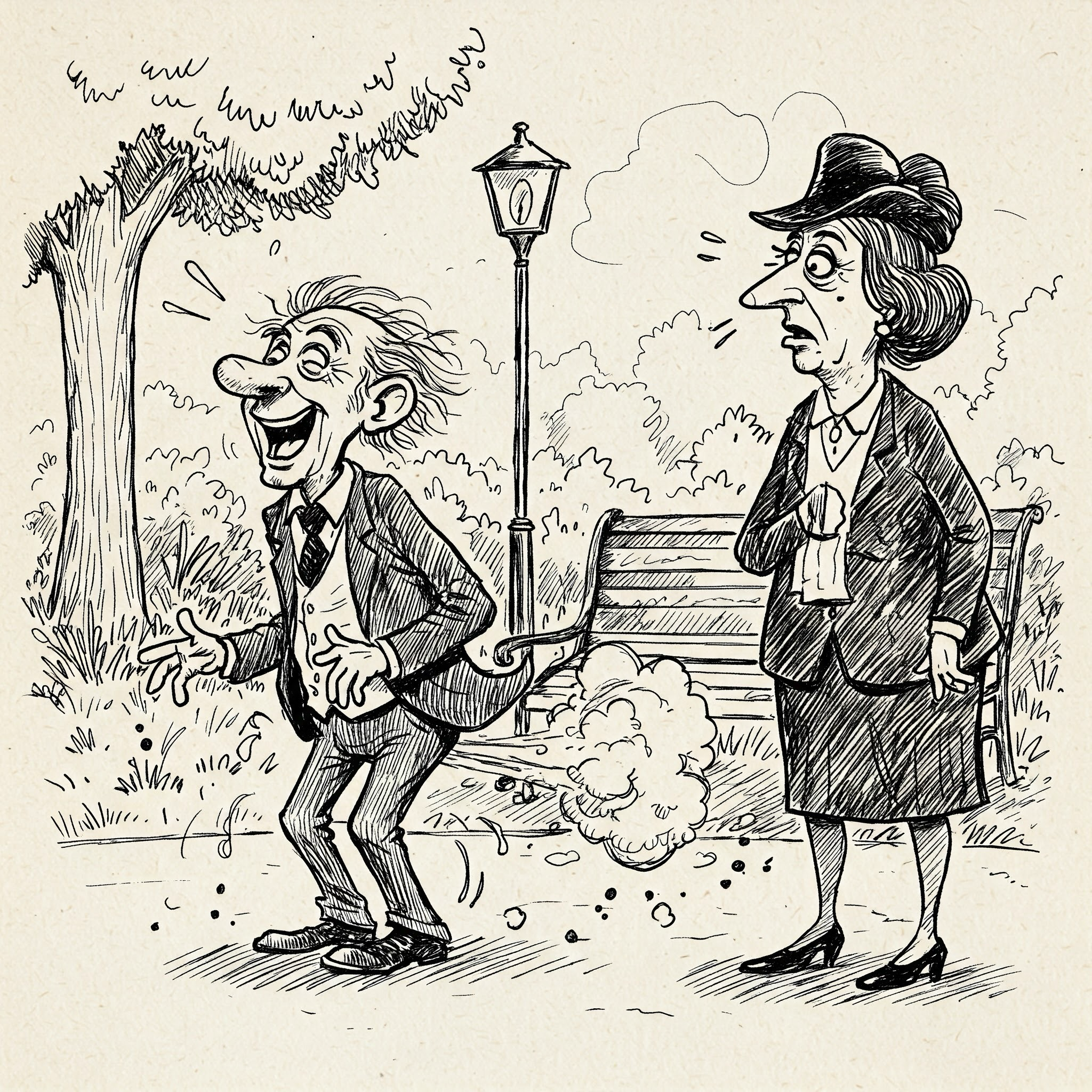In the chronically constipated town of Whiffleton—a place so terminally twee that even the pigeons wore cardigans—there lived one Harold Pumpernickel, a relic of a man with the look of a slightly deranged grandad who’d escaped from a biscuit tin. He was 84, allegedly sprightly, and had a digestive system more active than the town council on bin day. What he possessed in charm he more than compensated for in methane.
Harold was infamous in Whiffleton, not for any great achievement, but for his remarkable ability to weaponise wind. His bottom, a sort of rogue brass section, had caused more evacuations than a faulty fire drill and once—allegedly—disoriented a passing vicar’s labrador.
On one deceptively peaceful afternoon, with the sun dribbling cheerily over the rose beds and the town’s children busy weaponising sugar, Harold decided to grace the local park with his presence. He waddled towards his usual bench, a creaky affair with all the structural integrity of a church raffle, and sat down with the weary satisfaction of a man who’s just remembered where he left his teeth.
Alas, peace is fleeting when your intestines have the temperament of a Balkan orchestra. No sooner had Harold inhaled the allegedly “fresh” park air, than his lower abdomen began a slow, ominous boil. There was a moment—a stillness—that seasoned locals had come to recognise, followed by a noise that sounded not unlike an inflatable paddling pool surrendering to a harpoon.
Children froze mid-chase. Mothers clutched their pearls—or at least their oat milk lattes—and one poor dachshund lost control of its bladder entirely.
Unperturbed and mildly proud, Harold rose with the slow, theatrical grandeur of a man about to receive a knighthood or, in this case, deliver a medley in B-flat. “Ladies and gentlemen,” he declared, “I give you… the Wind Symphony!”
What followed was an interpretive performance of such grotesque creativity that even the pigeons fled. Each note was delivered with aplomb—soprano squeaks, baritone bellows, and one particularly jazzy solo that set off a nearby car alarm.
Children howled with glee. Mothers howled in horror. One elderly lady mistook it for a protest and began knitting a banner.
But then, as all tragicomedies must, the crescendo arrived.
With a final blast of post-lunch turbulence that could’ve unseated a parish councillor, Harold hit a note so deep it ruffled the ducks. Unfortunately, it also coincided with the arrival of Whiffleton’s mayor, Mrs. Beatrice Bluster—a woman with the warmth of a meat locker and the rigidity of her own corset.
“MR. PUMPERNICKEL!” she shrieked, as though summoning demons from the underworld. “This is a park, not the set of a Carry On film!”
Harold, never one to waste a theatrical opportunity, tipped an imaginary bowler hat and beamed. “Ah, but Madam Mayor, where there are clowns, there must be an audience!”
There was a pause, during which Mrs. Bluster’s eyebrows threatened a mutiny. Then—just once—her lips twitched. The twitch became a tremble. And then, God help us, she snorted.
And so it was that Harold Pumpernickel, aged 84, flatulent, unrepentant, and mildly deranged, became a folk hero. Henceforth known as “The Wind Whisperer,” he was invited to open fêtes, launch balloons, and, on one surreal occasion, serve as an emergency foghorn for the riverboat society.
Whiffleton never quite recovered. But then, neither did the bench.
